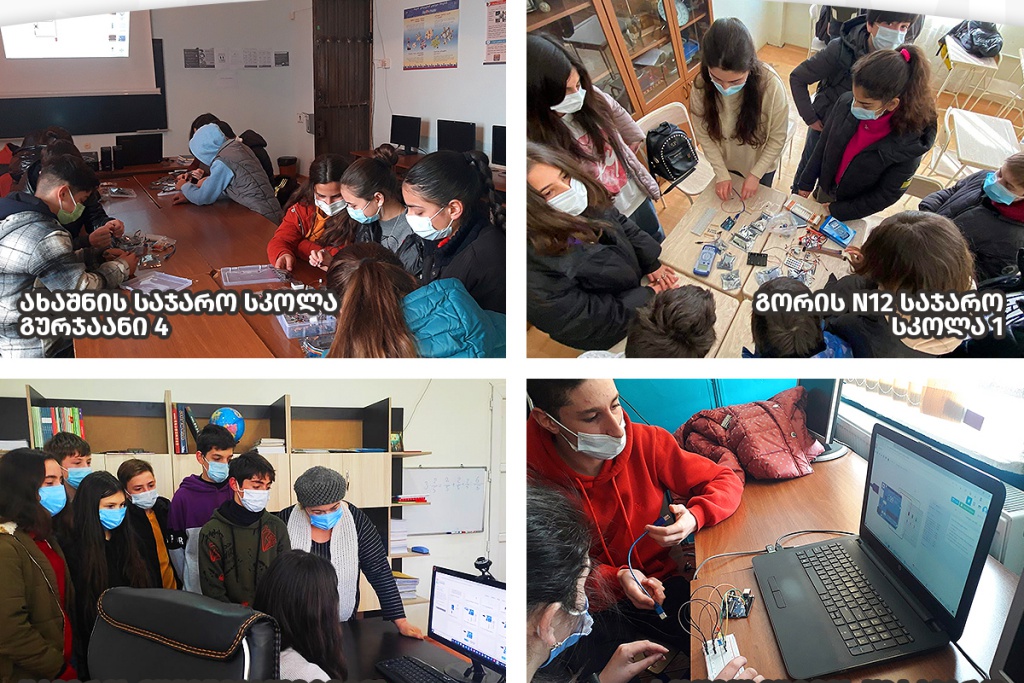
Within the framework of the project "STEM Mentors Course" implemented by the Millennium Foundation, the participating teachers established STEM clubs in schools of Gori, Kutaisi, Tsageri, Ozurgeti, Kareli, Akhaltsikhe, Batumi, Telavi, Gurjaani, Dmanisi, Tbilisi, Zestaponi and Ninotsminda.
STEM clubs comprised of school students aim to increase students' interest in science, technology, engineering and math (STEM) and to develop skills in these disciplines to create STEM projects.
The Millennium Foundation launched the STEM Mentors Course project in October 2021 with financial support from the US Embassy in Georgia. The aim of the project was to improve the quality of teaching in the STEM disciplines and to introduce teachers to modern teaching methodologies. 40 teachers from all regions of Georgia were selected from 450 applicants to participate in the project.
"Five months after the start of the STEM mentors' course, we already have a very significant result. Teachers share the knowledge gained in the course with their students and, most importantly, use the skills developed as a result of the project to increase students' interest in implementing innovative ideas. This was the main goal of this project to help teachers improve their ability to apply theoretical knowledge in practice. We are especially glad that most of our participants are from schools in the region, including from the ethnical minority regions, and the first STEM club has already been opened in the public school N2 in the village of Eshtia, Ninotsminda, "said Magda Magradze, Executive Director of the Millennium Foundation.
Professor Davit Songhulashvili and his two colleagues Marekhi Mazniashvili and Uta Kilasonia are leading the six-month course - "Modeling and designing educational and STEM projects".
The course leaders say that STEM is gradually gaining a foothold in the Georgian educational space, with the support of the Ministry of Education and Science, which organizes various STEM projects and trainings. This project has increased the readiness of teachers in this field to receive new ideas and implement innovative projects.
Professor Davit Songhulashvili says that the interest and involvement of teachers in the course is very high. "We have selected 40 candidates out of 450 candidates with great effort and this process, I think, has paid off, because all participants in the course are very motivated and try to get maximum information from us. Most importantly, the course participants were given the STEM laboratory kits, which enabled teachers to not only theoretically learn the working principle and programming, but also to independently create learning projects that are actively transferred to school-based STEM clubs."
Tamar Paposhvili, a teacher at a public school in the village of Akhashani in Gurjaani Municipality, believes that the knowledge gained during the STEM mentors' peer-to-peer learning process has become an opportunity for her to find new, more effective ways. Tamar has set up a STEM club at her school to involve students in the practical implementation of technological projects. "There was a great interest from the students in establishing our school STEM Club. Students from 7th to 11th grade expressed a desire to join the club. At the very first meeting they were involved in activities with astonishing interest. They were especially excited to bring virtual simple circuits into the real world. Technologies are developing very fast in the world, our country is still in a passive position in this regard. I mean, we're just in the role of user. Therefore, I believe that STEM clubs should be established in all schools to help students formulate innovative ideas and implement them, "said Tamar Paposhvili.
Maia Tateshvili, a teacher at Akhaltsikhe №5 Public School, thinks that the STEM Club she has set up will enable her students to develop creative and thinking skills as well as team-building skills. "I think club work, which is completely different from the teaching process, is vital for schools, because it is by working in a club that a student can apply theoretical knowledge in practice. It is practical work that helps them come up with new ideas, and this is especially important today when students' interest in science, engineering and technology is quite low. "
Another participant of the course, Asmat Lezhava, a teacher at Gori Public School No. 12, says that she transfers the knowledge gained in the STEM mentors' course on a daily basis and shares it with the students at a newly established STEM club. "Their interest and involvement are high, especially when they actually transfer simulations in the real world. The existence of the club makes it possible to popularize STEM subjects and let students be innovative. "
At the end of the STEM Mentors Course, the participants will participate in a project summarizing event to be held at the project partner university, Kutaisi International University.